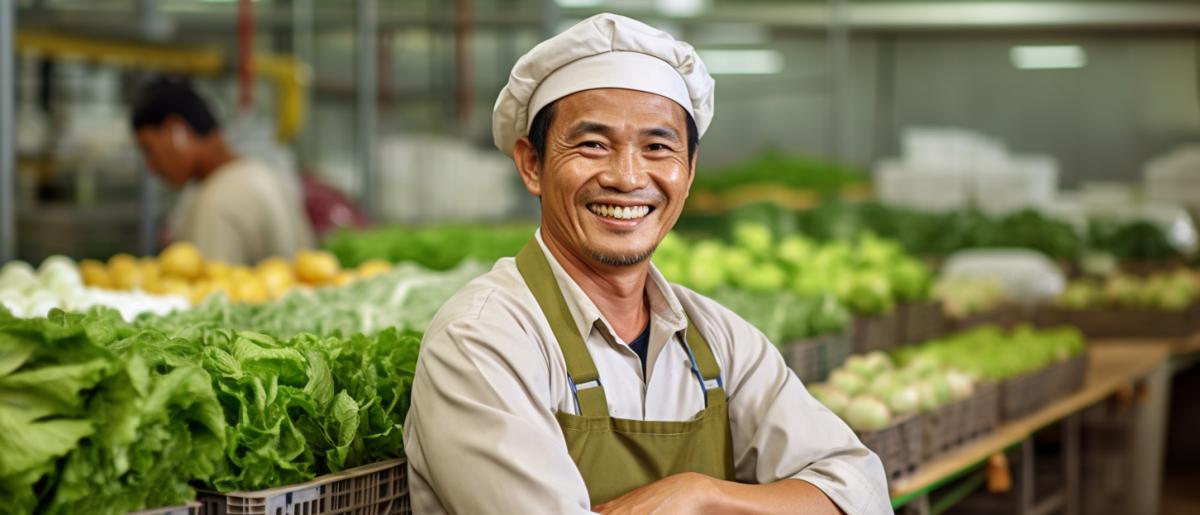

Fruit and vegetable processors in Australia play a significant role in transforming fresh produce into value-added forms ready for the market, a function critical in keeping the wheels of the country's economy turning. Still, the process is not without its challenges. Rising costs, fluctuating primary produce availability, and varying demand from retailers and consumers can put a significant strain on these businesses. Business loans can become the lifeline that keeps the industry afloat. These financial tools offer the working capital needed to invest in new machinery, improve processing facilities, and increase capacity to meet demand. In addition, they can provide a buffer against seasonal fluctuations, keeping the workforce employed and the business operational in lean times. Thus, understanding the utility of business loans for fruit and vegetable processors is of the utmost importance and can prove instrumental in ensuring the sustainability and growth of businesses in this sector.
Compare over 40+ lenders with one application.
Fruit and vegetable processing is a cornerstone of the Australian agricultural sector. Transforming freshly picked produce into canned and bottled items, these businesses are instrumental in extending the shelf-life of perishables, ensuring the availability of our favourite fruits and veggies year-round. These processors also play a critical role in supporting growers by purchasing their produce, often forming enduring relationships that help buoy the agricultural industry. The processing industry’s footprint extends beyond the farm gate too. It creates jobs, supports local economies, and contributes to Australia's export capacities, shipping preserved Aussie-grown goods to international markets. Despite its significance, the industry is not without its trials. Seasonal fluctuations in raw material availability, evolving consumer preferences, stringent food safety standards, regulatory changes, and the pressures of globalisation present ongoing challenges. Yet, these processors show remarkable resilience. They adapt, innovate, and invest to meet these challenges head-on – a testament to the essential role they play in our food supply chain. The right financing can further empower this industry to grow and maintain Australia's reputation as a provider of high-quality, safe, and delicious processed fruit and vegetable products. It's not just about having a dependable source of preserved fruits and veggies in our pantries. The fruit and vegetable processing industry is pivotal to Australia's agricultural landscape, local economies, food security, and global standing. That's the real value of fruit and vegetable processors in Australia.
Learn about eligibility and how to apply.
Fruit and Vegetable Processors in Australia face a unique set of challenges. Working in a sector that is pivotal yet demanding, these businesses must navigate a spectrum of complexities particular to the industry. One profound barrier is the fluctuation in market prices of fruits and vegetables. Seasonal variations, unpredictable weather, and shifts in consumer preferences can cause prices to swing, posing a significant hurdle for processors to maintain stable profits. Additionally, the costs of production, including labour and energy expenses, put additional pressure on the bottom line. Australia's stringent regulations around wages, contracts, safety, and health stand as a necessary but often taxing obligation. Another challenge is in preserving the freshness of their produce, considering its perishable nature. From field to factory to market, managing a tight supply chain to maintain quality and limit wastage can be a daunting task. Inefficient handling and storage can result in a reduction in produce quality, thereby impacting the processor's reputation and profitability. Not to mention the stiff competition faced from imported products, which are often cheaper but may not have been produced under the same rigourous environmental and health standards imposed in Australia. Rising to the occasion, domestic processors need to emphasise their quality and locally sourced ingredients, yet doing so can be arduous. Coping with these hurdles necessitates a robust financial backing. Here is where business loans could play a crucial role in supporting Fruit and Vegetable Processors in Australia. These loans could provide the much-needed funding to keep operations smooth, enhance storage facilities, adopt advanced technology, and strategise on marketing efforts that highlight the quality and origin of their products.
Calculate your repayment estimates and more.
Asset acquisition and expansion are major factors that drive a fruit and vegetable processing business forward, and obtaining a business loan can be instrumental in supporting these endeavours. These loans allow processors to acquire state-of-the-art equipment, enhance storage facilities, or even expand the scope of their operations. By investing in upgraded machinery, businesses can improve their fruit and vegetable processing capabilities, resultantly increasing production output and ensuring they meet customer demands effectively. Access to working capital is another benefit offered by business loans. Quite often, operations of this nature are subject to sporadic income streams, due to seasonality and fluctuating market demand. A business loan can help businesses manage their cashflow during lean periods, ensuring smooth running of day-to-day operations. Furthermore, it can also enable a business to seize unforeseen business opportunities, purchase inventory in bulk during off-peak seasons, or manage unexpected operational costs. Another important aspect to consider is the fact that a business loan can contribute to the business's credibility. By repaying a loan in a timely fashion, a company can enhance its credit historey and business profile, aiding future financing. This is especially crucial for Fruit and Vegetable Processors looking to form long-standing, profitable relationships with suppliers, customers, and other business partners. Thus, a business loan can prove to be an invaluable resource, powering the growth and sustainability of Fruit and Vegetable Processors in Australia.
Fruit and Vegetable Processors in Australia can secure several types of business loans. They can choose from short-term loans for immediate needs, equipment financing for machinery upgrades, and term loans for comprehensive business expansion. Different loans cater to unique needs, ensuring a more focused financial solution.
There are several types of business loans in Australia that can benefit Fruit and Vegetable Processors. Each of these loan types has its unique features, advantages, and potential disadvantages. Here are some of the most common types of business loans for Fruit and Vegetable Processors:
Overdraft Facility
This type of loan allows businesses in the fruit and vegetable processing industry to draw more money than is available in their account. It provides flexibility to meet short-term cash flow needs.
Business Line of Credit
This is a flexible loan that gives enterprises the ability to draw upon a pre-set amount of money when necessary. It can be used to cover unexpected costs or purchase equipment for the processing plant.
Commercial Loans
Commercial loans are an ideal solution for fruit and vegetable processors needing larger sums of money for significant investments, such as expanding facilities or purchasing high-cost machinery.
Equipment Finance
For processors needing to upgrade their machinery, equipment finance can help. This lending approach allows businesses to borrow money specifically for the purchase of new or second-hand equipment.
Asset Finance
This type of loan allows businesses in the fruit and vegetable processing sector to use their existing assets, like machinery or buildings, as collateral to secure funding.
Trade Finance
For processors importing machinery or other items, trade finance can provide the necessary funding. This type of loan is designed specifically to ease international trade transactions.
Invoice Financing
Invoice financing lets businesses turn their outstanding invoices into immediate cash, helping to improve cash flow during periods of growth or seasonal fluctuations.
Merchant Cash Advance
This advance provides businesses with a lump sum of cash in exchange for a percentage of future sales - a fitting choice for processors experiencing high sales seasonality.
Unsecured Business Loans
With no need for security, unsecured business loans can provide fast, accessible funding for processors looking to seize a new growth opportunity.
Term Loans
Offering a set borrowing amount to be repaid over a specific period, term loans are simple, straightforward, and can be used for a variety of business purposes within the fruit and vegetable processing industry.
Business loans serve as a lifeline to Fruit and Vegetable Processors, enabling them to invest in advanced machinery, improve warehouse facilities, and manage seasonal cash flows. With adequate funding, these businesses can enhance their operations, adapt to demands and stay competitive in Australia's thriving agrifood sector.
Here are some common reasons Fruit and Vegetable Processors use business loans:
Equipment Upgrade
Business loans can provide the funds necessary for Fruit and Vegetable Processors to replace or upgrade outdated equipment. This could range from sorting and packing machinery to cooling and storage facilities – all essential facets of maintaining the quality of the produce and ensuring efficient productivity.
Expansion of Business Operations
With a business loan, Fruit and Vegetable Processors could potentially expand their operations. Loans can cater to the costs of property purchase or lease, building extensions for increased production lines or additional storage spaces.
Investing in Technology
To stay competitive in today's fast-paced industry, Fruit and Vegetable Processors may need to invest in the latest technology. This may include software for inventory management, quality control systems or automated processing equipment, all of which can be funded through a business loan.
Working Capital
Business loans can help Fruit and Vegetable Processors manage their day-to-day operating expenses. This can cover wages, utility bills, transport costs, and raw material purchases, ensuring the smooth running of their operations.
Market Research
Understanding consumer behaviour and market trends is essential for any business. A business loan can finance comprehensive market research, helping Fruit and Vegetable Processors spot opportunities and make informed business decisions.
Hiring and Training Staff
The processing of fruits and vegetables can be labour-intensive. Business loans can be used to hire additional staff during peak seasons or invest in training programmes to enhance workforce skills.
Sustainability Initiatives
As consumers become more consciousness of food's environmental impact, some Fruit and Vegetable Processors might want to invest in sustainable farming practises or eco-friendly packaging. Business loans can provide the needed funds for such initiatives.
Catering to Order Fluctuations
There can be times when Fruit and Vegetable Processors may see an abrupt surge in orders, especially during holiday seasons. A business loan can be instrumental in meeting these sudden demands without affecting regular operations.
Export Opportunities
For Fruit and Vegetable Processors looking to reach global markets, business loans can support the additional costs involved. These could include compliance with international food regulations, packaging for long-distance transport or marketing efforts in foreign markets.
Debt Consolidation
Lastly, Fruit and Vegetable Processors can use business loans to consolidate any existing high-interest debts. This can make repayment easier and potentially save on interest payments.
To estimate your monthly repayments and the total cost of the loan, input the loan amount, loan term and interest rate into the calculator below. This helps you plan your budget and choose the most suitable loan terms.
These helpful FAQs will help you find the answers you need. If you can't find what you're looking for, you can request a callback below.